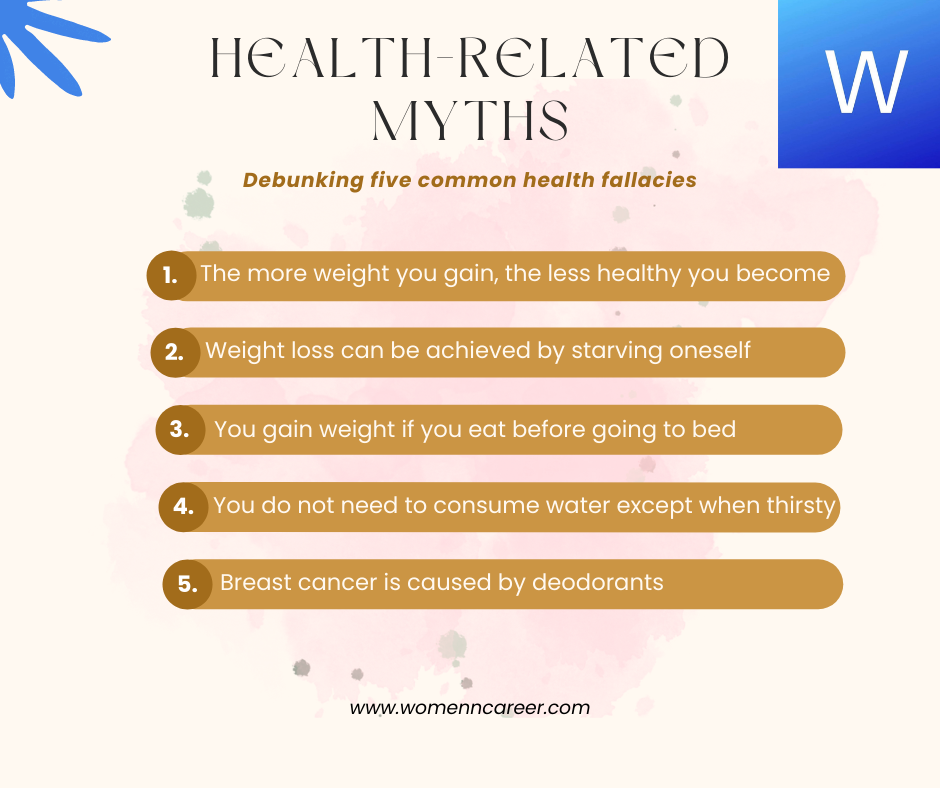
Let me begin by asking you a question: what was your initial reaction to this topic? Since you are reading this article, safe to say that it piqued your interest in finding out how many of your health beliefs are actually myths.
Many of us, like you, were taught different do’s and don’ts as children; and we still hold on to those views as teenagers and adults. It’s never too late to learn something new. Five common health fallacies are debunked in this article.
- The more weight you gain, the less healthy you become: We judge a person’s health based on their weight or physical size within our society. Although some health problems are linked to excess weight or fat; this does not suggest that everyone who is bigger or has a significantly larger size is unhealthy.
Monica Reinagel, a board-certified, licensed nutritionist and professionally trained chef, in her article on being healthy at any size, stated there are other indicators like; body sugar, blood pressure, blood fats, and inflammation that should be considered during health assessment. Being healthy is the result of a combination of genetic predisposition; and beneficial health practices such as healthy food and exercise.
- Weight loss can be achieved by starving oneself: While drastically cutting your daily calorie intake may be an efficient technique for losing weight; eating too little or starving yourself can cause your body’s metabolism to slow or stop. It can also cause your body to malfunction, and even lead to the deterioration of your mental health.
Health Canal, an online publication that focuses on health and medication in an article medically reviewed by Kimberly Langdon; a retired gynecologist with over 19 years of clinical experience, stated that continued starvation can lead to a drop in the levels of glucose; which causes decrease in insulin and a spike in glucagon levels. Ultimately, this may lead to many side effects associated to diabetes.

- You gain weight if you eat before going to bed: The claim supported by many health professionals and organisations, including The National Institute of Diabetes and Digestive and Kidney Diseases is that it is the amount of calories you take in, not the time of day you consume them, that affects the amount of weight you lost or gained. According to some nutritionists, what causes weight gain is simply eating more calories than you burn. This theory is called the calorie in/calorie out theory of weight control.
As long as you stay on track with your daily calorie intake, eating before bed won’t prevent you from reaching your weight-loss target. Therefore, you must remember that this does not necessarily apply to heavy-calorific foods; and that eating too close to bedtime can cause indigestion and sleeping problems. If you’re hungry right before night, choose foods that can potentially boost your metabolism; such as fruits, protein-packed snacks, and so on.
- You do not need to consume water except when thirsty: Our bodies are incredibly good at alerting us when something is wrong; so odds are that you will feel thirsty when lacking water. But you do not need to feel thirsty before consuming water. In fact, medical practitioners recommend drinking water before you thirst for it. This is in order to maintain important body functions; as well as replenish water lost through breath, perspiration, urine and bowel movements.
According to a recommendation made by the U.S. National Academies of Sciences, Engineering, and Medicine, an adequate daily fluid intake for men is about 15.5 cups (3.7 liters) of fluids a day; while that of women is about 11.5 cups (2.7 liters) of fluids a day. While this is more like an average quantity; and some people may require more or even less, it is best to remember to always stay hydrated.
- Breast cancer is caused by deodorants: There is a widespread belief that deodorant chemicals contain compounds that can harm breast cells and cause breast cancer. However, there is currently insufficient data to support this assertion; and National Cancer Institute has recognised that more research is needed to back up the claims.
Right now, you’re probably asking how you came to believe all of this. Safe to say that we have all believed one myth or another in our lifetime. There are other health myths that were not addressed in this article. It’s critical that we learn to verify any health-related statements; and ensure that they are backed up by scientific or medical evidence before spreading them as fact.
Did you enjoy reading this? Feel free to sign up here to get notifications.
Read Also: 5 Effective Tips to Stay Healthy in the Workplace

